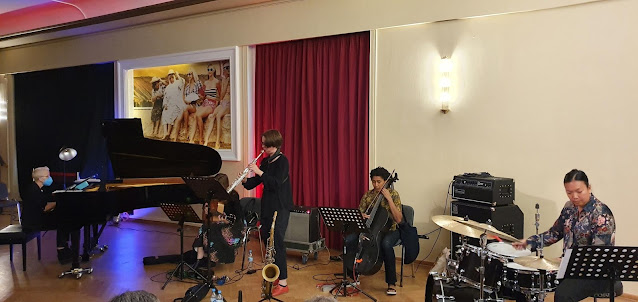Concert review, Myra Melford’s Fire and Water Quintet, organized by Jazzwerkstatt.
 |
| Myra Melford (p), Mary Halvorson (g), Ingrid Laubrock (s), Tomeka Reid (c), Susie Ibarra (d) |
Pianist Myra Melford and the members of her Fire and Water Quintet took to the stage area of the Institut Français Berlin under adverse conditions: it was too dark to see their music. The reason: the house crew were out with Covid. However, undeterred, the organizer found a small spotlight, adjusted the curtains to allow the late evening light into the room. Then the music began.
The set began with Melford interspersing lively melodic snippets with spiky rhythmic figures. She was then joined by cellist Tomeka Reid whose flitted purposely around the fingerboard. Next, percussionist Susie Ibarra joined, playing the snare and tom-toms by hand before picking up the nylon brushes and moving on to the cymbals. Then, Ingrid Laubrock entered with a flight of notes on soprano sax and quickly locked into a loose groove with the others. Finally, guitarist Mary Halvorson entered with her own set of quick runs delivered in a dry, effect-less tone. All in all, much like how their recent recording, For the Love of Fire and Water on Rouge Arts, begins.
A strong rhythmic figure took over as the group moved into the next tune. The riff was recognizable from the recording, which throughout contains these well placed, ear-worms that serve as milestones in the suite-like music. Towards the end of their several week European tour, the riff is a bit more elastic. There is a feeling that permeates the set as the players take more chances and stretch further out.
Even though each member has feature moments, both solo, like a particularly sonorous passage from Reid, or in duos, like Ibarra and Melford or Halvorson and Laubrock, the musical cohesion is uncanny. This particular piece ends in a blast of free-improvisation revealing just how much the musicians are collectively shaping their sound, listening and reacting, and then when the time is right, letting go.
Melford announced, at the mid-point of the show, that the group was playing music from the recent release as well as new music that she has been composing (see our interview from a couple weeks go here), and while it was not clear exactly which piece was which, the second set seemed to have a different feel. The playing was just as strong as the first set, but the compositional elements seemed more accentuated and the pieces more connected. The first song of the second set began like the very first one, with Melford and Ibarra playing together, but this time followed by a slinky, syncopated line, over which Laubrock delivered a fitting solo. This led to a gentle and expressive duet between Reid and Melford. As the others joined, it in intensity to cast a mesmerizing spell, each voice rising at times from the collective sound, but never breaking the moment.
The audience response was enthusiastic, with several concert goers remarking on just how powerful the second set, in particular, was. It is indeed hard to remember all of the earlier moments when each following is as powerful as the last, but regardless, The Fire and Water Quintet is an exciting group, and judging just from this performance, it seems like there is even more to look forward to.

